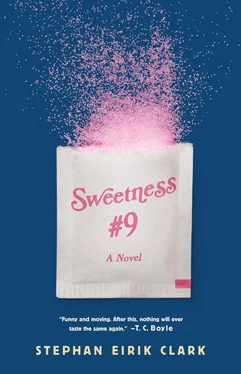“Kennedy!” Tennessee roared that day. He counted it off on one hand. “A New Englander, a bootlegger, a papist! How you gonna succeed in this industry if you don’t know a goddamn thing about John Fitzgerald Kennedy?”
His question, as I’d first learned at Greystone Park, wasn’t an unreasonable one. Ten thousand new food products are released into the American marketplace each year, and of these, nine out of every ten will fail.
“And you wanna know why?” Tennessee asked.
“Is it the quality of the flavorings used?” Koba gamely answered, before suggesting that perhaps the size of one’s advertising budget might play a part in it.
“Wrong!” Tennessee said. “Wrong again! Anticipation, that’s the goddamn thing.”
“Yes,” I put in, eager to contain my colleague’s passions. “Tennessee is absolutely right. A flavorist needs to be able to forecast where a culture will be so that he can know what it will want to taste when it gets there.”
“You’re goddamn right he does!”
“It does you no good to give a lemon-ginger chewing gum to a public raised up on wild strawberry. You may find success with that formula in Guangdong Province, but here in the United States you’ll only suffer a humiliating defeat.”
“You’re goddamn right you will!”
It didn’t matter that since Gorbachev had starred in a Pizza Hut commercial I could barely see my way through to the end of the day, to say nothing of the future. I was a senior flavorist, well versed in the theory of our trade, and it was my duty to share my knowledge with those coming along at my rear. We were like cultural anthropologists, I told Koba, and so in addition to having him read Beverage World and Prepared Foods and all the other expected trade journals, I stayed late with him at the office no less than twice a month so we could flip through collectible Sears, Roebuck catalogues or discuss the importance of Bat Boy or Bigfoot or some other recurring character from the Weekly World News. I felt somehow responsible for him, though perhaps subconsciously I was only trying to work through those memories of my own awkward transition into American life. Whatever the reason, I gave Koba regular assignments and tested him weekly. One Saturday I had him attend several Little League games in Toms River and write a brief report about what was selling well at the snack shack; the next I had him scout out the cereal aisle at the local Acme for so long that security was called in on the suspicion that he was a lurking pedophile.
Beekley, whose expertise on hip hop, extreme sports, and conspiracy theories of the post — Cold War era filled in the holes in my own scholarship, joined us on several occasions to offer a younger perspective. Once he had us follow him out to the parking lot, where we found an orange 1969 Dodge Charger parked and waiting for us. “Slide in through the windows,” he instructed. “Not like that. Legs first.” Koba was a gangly fellow, six foot four at least, all knees and elbows, and with thick-framed glasses that were quick to slide down the bridge of his nose. “Give him a little push then, David. There we go.” Minutes later we were racing down the Turnpike and Beekley was lecturing Koba on the “General Lee,” daisy dukes, and the late-career evangelism of John Schneider.
“Write that down,” he’d say every few minutes. “That’s important. Then get back to me next week with three thousand words on the mustache and its rôle in promoting or subverting traditional notions of masculinity in the nineteen seventies. Do not,” he said, emphasizing this by giving a quick double toot of the horn, “forget to analyze the mustache as homosexual icon.”
Before I could ask Koba to cover for me that morning, I heard Ernst’s voice moving in from the test kitchen, and then saw him appear at the door with the children from science camp crowding in around him.
“This is where we put the pleasure in,” he said. “That man there is ‘Tennessee’ Terrence Matthews, our longest-tenured senior flavorist.” He barely nodded hello. “And this one here”—Koba gave a big smile as Ernst pointed him out—“is FlavAmerica’s newest apprentice, Koba.”
Koba came over to Ernst, holding a test tube in one hand and a glass pipette in the other. Earlier that morning I’d given him an assignment: to devise a bing cherry flavoring like the one he’d come up with the day before, only this time using chemicals that had a combined cost of 30 percent less.
“Price points,” Koba said, after explaining his task to the group. “This is how one wins battles in the food and flavorings industry. Isn’t that right, David? By making sure you can beat your competitor on price points.”
With an approving nod from me, Koba stepped out amongst the children and passed the mouth of his test tube beneath their noses.
“Cherry!” one boy shrieked. “It smells just like a cherry!”
“Can I taste it?” the obese Asian boy asked, his flared feet spread wide beneath him.
“No, I’m afraid not,” Koba smiled, lifting his thick Stalinist mustache and flashing his brilliant white teeth. “Excepting for the rare coffee flavoring, we don’t taste much of what we make here, at least not at this early stage. The nose is more than enough.”
“Mmm,” Ernst agreed. “Your tongue’s reputation is greater than its abilities. Seventy percent of flavor is perceived by the nose. The nose,” he said.
“Just think back to the last time you were sick,” Koba added, and I was glad to see him so eager to contribute. Such a dedicated worker! You could see it in the argyle socks that matched the sweater vest he wore beneath his starched white lab coat in the winter, and in the clean part of his hair that was present all year round. Business. That’s what you thought of when you saw Koba: business. “Why, with a stuffed nose and swollen glands,” he said, “I’m sure you couldn’t have tasted much more than the salt in your chicken soup, now could you?”
“Though our thoughts on flavor shouldn’t stop there,” I said. “For how would fried chicken taste without its crunch? Or a peach without its fuzz?”
“Color is no less important,” Ernst said, shaking a bony finger. “Who among you would eat a split pea soup if it were blue? Or red?”
The children laughed.
“You’d have to eat it blindfolded, no matter how delicious.”
“Flavor is a most mysterious thing indeed,” Koba concluded, “and yet in the end it is also very simple. Put something in your mouth and you don’t have to think about it: you either spit or swallow.”
It was an innocent mistake, but still one that left a precocious young boy shuffling a fist up beside his mouth while distending his far cheek with a poke of his tongue.
“Kevin!” the elder chaperone said, giving him a slap on the shoulder.
I coughed into my fist—“Yes, thank you, Koba”—and pushed out through the crowd into the hallway, already thinking of Deep Throat and Behind the Green Door, blue movies that would form the basis of my next cultural lecture, the title of which I’d announce to my apprentice in a memo later that day: “The Evolution of American Pornography from the 2¢ Postcard to the 10 GB Hard Drive.”
“Just this way now,” I said, throwing my hand out toward the double doors, “and we’ll go out to the killing floor, where all of our orders are prepared in bulk.”
* I could reference a fifth basic taste, umami , but not without inviting controversy. This much is irrefutable: In 1908, Japan’s Dr. Kikunae Ikeda, Ph D, walked out into the Pacific with his trouser legs rolled high and pulled from between his pale white feet a simple piece of green sea tangle. If there is in the history of food science an act that rivals that of the lifting of Excalibur, this very well may be it, for it was from this slender curl of kombu seaweed that Dr. Ikeda extracted the salts of the naturally produced glutamic acid, thus isolating what he believed to be the fifth basic taste available in this world—“something common in the complicated taste of asparagus, tomatoes, cheese and meat,” to use the words Dr. Ikeda himself spoke at the 8th International Congress of Applied Chemistry in Chicago in 1912.
Читать дальше












